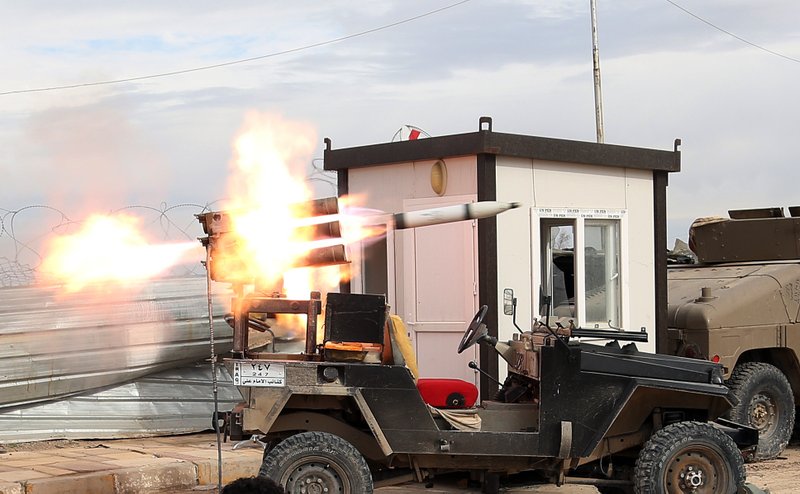TIKRIT, Iraq -- The U.S.-led coalition battling the Islamic State extremist group has begun surveillance flights over the northern Iraqi town of Tikrit, a senior coalition official said Tuesday, marking the first time the alliance has taken part in a major offensive there that is being spearheaded by Iranian-backed Shiite militias.
The official said the flights and intelligence sharing began Saturday and were requested by the Iraqi government. He declined to comment on whether the coalition was carrying out airstrikes, saying he cannot discuss current or future operations. He spoke on condition of anonymity because he was not authorized to speak to journalists.
Up to now, the offensive to take back Tikrit, Saddam Hussein's hometown, has largely has been waged by Iraqi troops and Shiite militias advised by Gen. Qassem Soleimani, commander of the elite Quds Force of Iran's Revolutionary Guard. The coalition official declined to discuss whether U.S. forces were directly communicating with Iranians on the ground there.
Both the U.S. and Iran view the Islamic State as a major threat but insist they are not coordinating their actions. The U.S. had previously said it was not taking part in the Tikrit offensive because it had received no request to do so from Baghdad.
A U.S.-led air campaign, launched in August, has allowed Iraqi forces to halt the Islamic State's advance and claw back some of the territory it seized over the summer, but the growing Iranian presence on the ground has complicated the mission, with Washington refusing to work directly with a country it views as a regional menace.
A senior Iraqi military official said the coalition is not providing airstrikes in support of the Tikrit operation but launched airstrikes on the nearby oil refinery town of Beiji on Tuesday. He added that Soleimani had just left Tikrit after providing front-line assistance and advising since the start of the operation.
"He will come back if we need him to," said the Iraqi official, who spoke on condition of anonymity because he's not authorized to speak to journalists.
The Sunni city of Tikrit lies about 80 miles north of Baghdad. It is one of the largest cities held by the Islamic State and lies on the road connecting Baghdad to militant-held Mosul, the country's second-largest city.
In Mosul on Tuesday, Islamic State militants stoned a man and woman to death on charges of adultery, parading the victims in a public square, witnesses and an Iraqi military official said.
Later in the day, the militants beheaded three young men on a street in central Mosul, accusing them of being the nephews of a political opponent of the Islamic State.
The victims were not identified. It was not known whether they had been given a trial, but none was held in public.
Their deaths were the latest in a series of public executions of people accused of social offenses in the city, which the militants wrested from Iraqi control in June.
U.S. military officials have said a coordinated mission to retake Mosul likely will begin in April or May and involve up to 25,000 Iraqi troops. But the Americans have cautioned that if the Iraqis are not ready, the offensive could be delayed.
The U.S. and other coalition members have been providing weapons and training to Iraqi and Kurdish forces in the north in an effort to prepare them for the battle ahead.
The Tikrit operation is the largest to date and requires careful air and ground coordination in order to minimize civilian casualties and damage to the city's infrastructure.
Pentagon spokesman Col. Steve Warren said Tuesday that the Iraqi ground operation against the Islamic State has "stalled" and that the Tikrit operation "has not moved forward recently."
"They certainly have not given up," he said, adding that "urban combat is exceedingly difficult combat."
Elsewhere Tuesday, Canadian Prime Minister Stephen Harper announced that his country is expanding its military mission against the Islamic State to include airstrikes on targets in Syria. Canadian airstrikes have been limited to extremist targets in Iraq so far.
Harper also announced a one-year extension of the mission against the Islamic State, which is now set to expire March 30, 2016.
Harper told Parliament he will not seek "the express consent" of President Bashar Assad's government for the airstrikes but will work closely with allies who have been carrying out such airstrikes against the extremists over Syria in recent months.
Canada will be the first NATO country, other than the United States, to conduct airstrikes in Syria. Bahrain, Saudi Arabia, Jordan and the United Arab Emirates also have done so.
Information for this article was contributed by Vivian Salama, Qassim Abdul-Zahra, Robert Burns and Rob Gillies of The Associated Press and by Rod Nordland and staff members of The New York Times.
A Section on 03/25/2015

